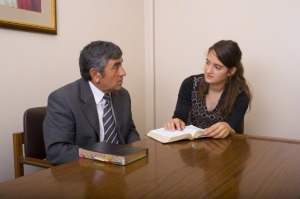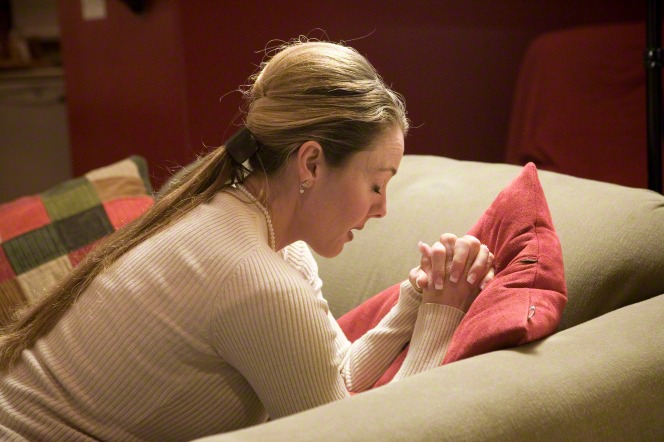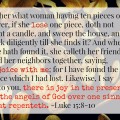A snarky 20 year old guy who was a devoted member of my church once lived in the apartment we used to rent out in our basement. He had a quirky habit of playing practical jokes and I had no sense of humor. His timing was perfect; he always got me at the most inopportune moments. And did I mention he was immature? I grew to loathe his “talent.” One time he got me really good, riled my dander, and ruined my day, and I remember yelling down to him, “I will never forgive you for this!” To which he shot up a reply, “Oh yes you will—you have to if you want to make it to heaven!” I fumed for the rest of the day. Not because he got me again, and got me good, but because there was a drop of truth to his response. Forgiveness doesn’t absolve the accused—it cleanses the victim. We need to be clean if we want to be in the presence of our Lord. We need to forgive. I had a lot of work to do.
 Last week I took out my latter-day microscope and analyzed the musical “Scrooge” based on Charles Dickens’s A Christmas Carol. I asked the question, “Can people really change?” The answer was a resounding yes, if they let the Savior walk them through the changes. We’ve all had scrooges who’ve hurt us. Whether they’re the simple practical jokers who annoy us, or someone more destructive—an estranged spouse, a cruel boss, an abusive or neglectful relative—the question of forgiveness lies in our lap just as heavily as the crimes of their actions weigh them down. How can we be truly clean if we neglect to forgive? And how can we forgive when it hurts so much? Let’s take a breath and walk through the forgiveness process together.
Last week I took out my latter-day microscope and analyzed the musical “Scrooge” based on Charles Dickens’s A Christmas Carol. I asked the question, “Can people really change?” The answer was a resounding yes, if they let the Savior walk them through the changes. We’ve all had scrooges who’ve hurt us. Whether they’re the simple practical jokers who annoy us, or someone more destructive—an estranged spouse, a cruel boss, an abusive or neglectful relative—the question of forgiveness lies in our lap just as heavily as the crimes of their actions weigh them down. How can we be truly clean if we neglect to forgive? And how can we forgive when it hurts so much? Let’s take a breath and walk through the forgiveness process together.
Forgiveness is often a misunderstood action, probably because when we are in need of forgiving someone, we are still riling in hurt feelings over their actions against us. We can’t possibly begin to forgive when our minds are burdened with the cloudy, unsettled feelings of anger and pain. Take a step back and remember what forgiveness is—and what it isn’t.
Forgiving others does not mean approving of their wrongdoing or offense. Forgiving someone means that with the help of our Father in Heaven, we can cleanse our hearts of anger or hatred toward the offender, cease to dwell on the offense, and feel peace. This process is not always easy or quick, but Heavenly Father will help us as we try to forgive. (Preparing for Exaltation: Teacher’s Manual, (1998), 197–202)
 When someone has truly hurt me, I often times come back to this definition. It is so helpful to remember that forgiveness does not absolve the person from their accountability. That is something they must face with the Lord and in the Lord’s time. Forgiveness is for me. It is dangerous for me to dwell on the aggressor during my own forgiving process. I use the word dangerous because the poisons of anger and hurt destroy my soul, and my soul is the one that needs healing first and foremost. I need to separate the oppressor’s crimes from my own crime of holding onto anger, then let the Lord walk with me as he so willingly offers to do. That is the first step. Christ told us himself he would walk with us when he said “Come unto me, all ye that labor and are heavy laden and I will give you rest. Take my yoke upon you, learn of me; for I am meek and lowly in heart and ye shall find rest unto your souls. My yoke is easy and my burden is light.” (Matthew11:28-30).
When someone has truly hurt me, I often times come back to this definition. It is so helpful to remember that forgiveness does not absolve the person from their accountability. That is something they must face with the Lord and in the Lord’s time. Forgiveness is for me. It is dangerous for me to dwell on the aggressor during my own forgiving process. I use the word dangerous because the poisons of anger and hurt destroy my soul, and my soul is the one that needs healing first and foremost. I need to separate the oppressor’s crimes from my own crime of holding onto anger, then let the Lord walk with me as he so willingly offers to do. That is the first step. Christ told us himself he would walk with us when he said “Come unto me, all ye that labor and are heavy laden and I will give you rest. Take my yoke upon you, learn of me; for I am meek and lowly in heart and ye shall find rest unto your souls. My yoke is easy and my burden is light.” (Matthew11:28-30).
“When we burden ourselves with anger, hate, and vengeance, we forfeit the blessings of having the guidance of the Holy Spirit. We invite the spirit of the adversary into our lives and thus limit our own progress toward exaltation when we are unforgiving. We invite the Holy Spirit into our lives when we follow the example of Jesus Christ and truly forgive.” (Preparing for Exaltation: Teacher’s Manual, (1998), 197–202)
As a Latter-day Saint, I recognize that the Holy Spirit is the still small feeling of peace and clarity of mind and heart that comes over me when I hear something that is right and when I do and say things that are good. Some call it your conscience, but we recognize the divine source of this feeling. Anyone can train themselves to feel it, but it takes time and effort. As the quote above states, this can be done through following the examples of Jesus Christ. Elder Richard G. Scott of the Quorum of the Twelve Apostles said, “Forgiveness … allows the love of God to purge your heart and mind of the poison of hate. It cleanses your consciousness of the desire for revenge. It makes place for the purifying, healing, restoring love of the Lord” (in Conference Report, Apr. 1992, 45; or Ensign, May 1992, 33).
 While each of us goes through our own Gethsemane, we can learn from the examples of what others have had to endure. Bishop H. Burke Peterson, when he was First Counselor in the Presiding Bishopric of the Church of Jesus Christ of Latter-day Saints, related the following story in a conference talk.
While each of us goes through our own Gethsemane, we can learn from the examples of what others have had to endure. Bishop H. Burke Peterson, when he was First Counselor in the Presiding Bishopric of the Church of Jesus Christ of Latter-day Saints, related the following story in a conference talk.
“During World War II there were terrible examples of man’s inhumanity to man. After the war was over and the concentration camps were opened, there was much hatred among the weak and emaciated survivors. In one camp, observers noticed a native of Poland who seemed so robust and peaceful they thought he must have only recently been imprisoned. They were surprised to learn that he had been there over six years! Then, they reasoned, he must not have suffered the terrible atrocities to his family members that most of the prisoners had. But in questioning him, they learned how soldiers had come to his city, lined up against a wall his wife, two daughters, and three small sons, then opened fire with a machine gun. Though he begged to die with them, he had been kept alive because of his knowledge and ability in language translation.
“This Polish father said: ‘I had to decide right then … whether to let myself hate the soldiers who had done this. It was an easy decision, really. I was a lawyer. In my practice I had seen … what hate could do to people’s minds and bodies. Hate had just killed the six people who mattered most to me in the world. I decided then that I would spend the rest of my life—whether it was a few days or many years—loving every person I came in contact with’ (George G. Ritchie with Elizabeth Sherrill, Return from Tomorrow [Waco, Texas: Chosen Books, 1978], p. 116)” (in Conference Report, Oct. 1983, 84–85; or Ensign, Nov. 1983, 60).
It takes a courageous heart to see the effects of hate and decide never to be a vehicle of hate again. The true story of Louis Zamperini, an Olympic athlete who joined the armed forces during the Second World War, only to be captured by the Japanese navy after a plane crash in the Pacific, is a story of overcoming hate. His true transformation occurred years after his imprisonment when he came to an understanding of Christ’s role in his life. This was the turning point where he was able to forgive.
Elder Gordon B. Hinckley said when he was a member of the Quorum of the Twelve Apostles, “There is no peace in harboring old grudges. There is no peace in reflecting on the pain of old wounds. There is peace only in repentance and forgiveness. This is the sweet peace of the Christ, who said, ‘Blessed are the peacemakers; for they shall be called the children of God’ (Matthew 5:9)”
Why hold the burden of hate any longer? Why not rest your weary arms and try a different way? You deserve the refreshing comfort of peace that will wash over you when you drop the weight of anger and allow forgiveness to lift you up and carry you home.
Nanette O’Neal loves the gospel and is very happy to share her testimony on LDS Blogs. She is a convert to the church and still feels the spirit burn strong within her heart. She graduated from Mason Gross School of the Arts with a degree in music education and has taught children and adults in the private and public sphere for over twenty years. Nanette continues to study the gospel and the art of writing. She writes weekly inspirational articles on her blog and is currently working on an LDS fantasy novel series, A Doorway Back to Forever. You can find her at NanetteONeal.blogspot.com. Nanette has a wonderful husband, talented son, and three beautiful dogs.







